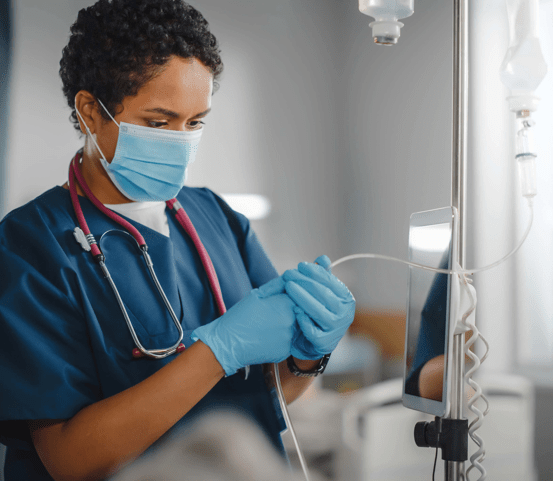Monoclonal antibody therapy is available for those recently diagnosed with COVID-19.
You have a fever, cough, shortness of breath, body aches and other symptoms. They could be signs of COVID-19 or of the flu, or of some other condition altogether. What should you do?

Most people should get a COVID-19 test and follow up with their primary care physician, says Schubert Perotte, MD, Chair of Emergency Medicine at Jersey City Medical Center (JCMC). Tests are available free of charge at select pharmacies and health centers. (Find a site near you at www.hhs.gov/ coronavirus/index.html.)
However, if your symptoms are severe, go to the Emergency Department (ED) for a test and evaluation.
“Come in if you are having a significant amount of coughing with shortness of breath, or really high fever with shaking, chills and diarrhea,” says Dr. Perotte. “We worry about those patients progressively getting worse or getting dehydrated. We also advise that you go to the ED if you have COVID-19 symptoms and are of advanced age, have multiple medical problems or are immune-compromised in some way, shape or form.”
An Effective Treatment
Patients who have tested positive for COVID-19 within the preceding 10 days may be eligible for monoclonal antibody therapy. The treatment may be advised for patients with mild, moderate or severe symptoms, as well as for people with risk factors such as kidney disease, diabetes or a compromised immune system.
“We’ve been very successful with monoclonal antibodies,” says Dr. Perotte. “We can get patients turned around pretty quickly.”
The human body naturally makes antibodies to fight infection. However, most people don’t have antibodies designed to recognize a new virus like SARSCoV- 2, the virus that causes COVID-19.
Monoclonal antibodies are made in a laboratory to fight a specific infection, in this case SARS-CoV-2. The antibodies are given through a one-time infusion to a person who has already been diagnosed with COVID-19. Patients get temporary enhanced immunity, which helps them avoid a potentially dangerous progression of the disease.
“This treatment is provided here in the ED, not in a doctor’s office, because it requires an intravenous infusion and the patient has to be monitored for any adverse reactions,” says Dr. Perotte.
Vaccines Still Key
Monoclonal antibody therapy doesn’t replace the need for a COVID-19 vaccine, says Dr. Perotte. The type of immunity that results from monoclonal antibodies is not the same as the type of immunity created by the vaccine.
A vaccine helps stimulate a person’s own immune system so it’s prepared and ready to respond if it’s exposed to a virus. That protection is more effective and lasts much longer than the protection given by monoclonal antibodies.
“Vaccinated or unvaccinated, we will treat you with monoclonal antibodies if you are eligible,” says Dr. Perotte. “However, in the case of a breakthrough infection—in which a vaccinated person comes down with COVID-19—the vaccinated patients have had better outcomes and fewer symptoms compared to their unvaccinated counterparts.”
While the majority of COVID-19 patients don’t need to be admitted to the hospital, “a very small percentage of them may require hospitalization based upon their symptoms, diagnostics and vital signs,” says Dr. Perotte.
Monoclonal antibody therapy is available in EDs throughout RWJBarnabas Health (RWJBH), the health system to which JCMC belongs. RWJBH was among the first health systems in the state to administer monoclonal antibody treatment, which was authorized for emergency use by the U.S. Food and Drug Administration in November 2020. This past October, RWJBH celebrated a milestone by delivering its 10,000th dose.
Get Vaccinated for COVID-19 and the Flu, TooBoth the flu and COVID-19 are spread mainly by large and small particles containing viruses that are expelled when people with the illness cough, sneeze or talk. Last year, masking and social distancing contributed to a very mild flu season. But with those practices relaxed this year, health care experts are worried about a long winter battling both the flu and COVID-19. The good news is that unlike last year, vaccines are widely available for COVID-19, in addition to vaccines to protect against the flu. “Some people ask if it’s safe to get both flu and COVID-19 vaccines,” says Schubert Perotte, MD, Chair of Emergency Medicine at JCMC. “The answer is that patients who have gotten both vaccines have done just fine.” The Emergency Department is not the place to go for vaccines, however. “There are plenty of outpatient sites for vaccines,” Dr. Perotte says, “and we strongly encourage everyone to get both.” |
Learn more about COVID-19.
